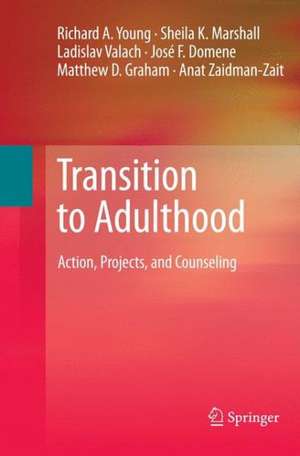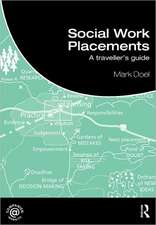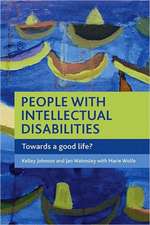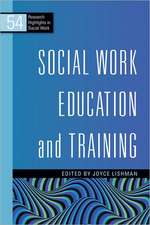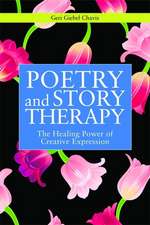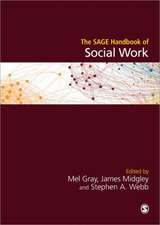Transition to Adulthood: Action, Projects, and Counseling
Autor Richard A. Young, Sheila K. Marshall, Ladislav Valach, José F. Domene, Matthew D. Graham, Anat Zaidman-Zaiten Limba Engleză Paperback – 11 oct 2014
Active Transition to Adulthood: A New Approach for Counseling will discuss the authors’ work on the transition to adulthood (including early and late adolescence) from an entirely innovative perspective – action theory. Over a period of 10-15 years the authors have collected substantial data on adolescents and youth in transition, and will present an approach to counseling based on these data and cases. The action theory perspective in which the authors have grounded their work addresses the intentional, goal-directed behavior of persons and groups that is expressed through particular actions, longer-term projects, and life-encompassing careers. In this book, both transition to adulthood and counseling will be covered in the language of goal-directed action. In this way both transition and counseling reflect and capture the action, projects, and careers in which families, youth, and clients are engaged and use to construct on-going identity and other narratives.
| Toate formatele și edițiile | Preț | Express |
|---|---|---|
| Paperback (1) | 549.64 lei 38-45 zile | |
| Springer – 11 oct 2014 | 549.64 lei 38-45 zile | |
| Hardback (1) | 894.97 lei 6-8 săpt. | |
| Springer – 17 sep 2010 | 894.97 lei 6-8 săpt. |
Preț: 549.64 lei
Preț vechi: 678.57 lei
-19% Nou
Puncte Express: 824
Preț estimativ în valută:
105.20€ • 109.41$ • 88.16£
105.20€ • 109.41$ • 88.16£
Carte tipărită la comandă
Livrare economică 10-17 martie
Preluare comenzi: 021 569.72.76
Specificații
ISBN-13: 9781489997500
ISBN-10: 1489997504
Pagini: 248
Ilustrații: X, 238 p.
Dimensiuni: 155 x 235 x 13 mm
Greutate: 0.35 kg
Ediția:2011
Editura: Springer
Colecția Springer
Locul publicării:New York, NY, United States
ISBN-10: 1489997504
Pagini: 248
Ilustrații: X, 238 p.
Dimensiuni: 155 x 235 x 13 mm
Greutate: 0.35 kg
Ediția:2011
Editura: Springer
Colecția Springer
Locul publicării:New York, NY, United States
Public țintă
Professional/practitionerCuprins
Transition to Adulthood: Introduction.- Transition to Adulthood as Goal-Directed Action.- Action and the practice of counseling for transitions.- Studying Transition Processes.- Relationships.- Emotion and the Transition to Adulthood.- Identity.- Family.- Work.- Culture.- Romantic Relationships.- Transition in the Context of Disability.- Suicide in the Context of the Transition to Adulthood.- Working with Narrative and Interpretation.- Using the Self-Confrontation Procedure in Counseling.
Recenzii
From the reviews:
“Much research on youth focuses on general patterns within populations or subpopulations and is not very helpful for understanding – let alone helping – individual young people. This book provides a powerful new framework for understanding individual youth as they take on the tasks associated with becoming adults – identity, love, career, life style, and meaning. This framework (approach) helps us think about how these tasks are negotiated in daily contexts – and particularly in and through relationships with significant others.
Useful for both researchers and practitioners, this book could serve as an excellent text for a course on the transition to adulthood, adolescence, or related topics. It also includes excellent case examples that make the concepts/ framework tangible.” – Reed W. Larson, University of Illinois, Urbana, IL
“This extraordinary team of authors brings remarkable insight and years of research to bear on the many facets of the dynamic transition to adulthood. The book attends to the very social nature of this transition by skillfully applying an action theoretical perspective to compelling case material. This masterfully written book is destined to become a landmark. It is intellectual and at the same time accessible. Brilliant!” - Donna Schultheiss, Cleveland State University, Cleveland, OH
“Richard Young and colleagues present an extremely restrictive, intellectualized, analytical model of psychological processes that occur during development. … It is a conscious, purposeful attempt to devise a model of psychological functioning based on contemporary philosophical ideas and concerns. … The literature reviews in the chapters illustrating the application of action theory to various realms (e.g., relationships, career, suicide) are well researched and informative. This book would be most appreciated by academics and scholars interested in thecentral subject matter and associated philosophies.” (Judith Kingstone, PsycCRITIQUES, Vol. 56 (40), October, 2011)
“Much research on youth focuses on general patterns within populations or subpopulations and is not very helpful for understanding – let alone helping – individual young people. This book provides a powerful new framework for understanding individual youth as they take on the tasks associated with becoming adults – identity, love, career, life style, and meaning. This framework (approach) helps us think about how these tasks are negotiated in daily contexts – and particularly in and through relationships with significant others.
Useful for both researchers and practitioners, this book could serve as an excellent text for a course on the transition to adulthood, adolescence, or related topics. It also includes excellent case examples that make the concepts/ framework tangible.” – Reed W. Larson, University of Illinois, Urbana, IL
“This extraordinary team of authors brings remarkable insight and years of research to bear on the many facets of the dynamic transition to adulthood. The book attends to the very social nature of this transition by skillfully applying an action theoretical perspective to compelling case material. This masterfully written book is destined to become a landmark. It is intellectual and at the same time accessible. Brilliant!” - Donna Schultheiss, Cleveland State University, Cleveland, OH
“Richard Young and colleagues present an extremely restrictive, intellectualized, analytical model of psychological processes that occur during development. … It is a conscious, purposeful attempt to devise a model of psychological functioning based on contemporary philosophical ideas and concerns. … The literature reviews in the chapters illustrating the application of action theory to various realms (e.g., relationships, career, suicide) are well researched and informative. This book would be most appreciated by academics and scholars interested in thecentral subject matter and associated philosophies.” (Judith Kingstone, PsycCRITIQUES, Vol. 56 (40), October, 2011)
Notă biografică
Richard A. Young, Ph.D., is Professor of Counselling Psychology at the University of British Columbia. He is a Fellow of the American and Canadian Psychological Associations, a Registered Psychologist in British Columbia, and President of Division 16 (Counselling Psychology) of the International Association of Applied Psychology. He is a founding member of the Aeschi Group on Meeting the Suicidal Person. His current interests include the application of action theory and the qualitative action-project method to a variety of research topics, including the transition to adulthood, families, career development, health, and suicide.
Sheila K. Marshall is an Associate Professor of Family Studies at the University of British Columbia. Her research investigates adolescent-parent interactions and the transfer and uptake of rights and responsibilities during the transition to adulthood. She is particularly interested in the management of information between adolescents and parents and how it, in turn, influences actions such as identity construction and resource sharing.
Ladislav Valach is Oberassistant at the Institute of Psychology, Psychopathology and Clinical Intervention, University Zurich and a private practitioner. He is a founding member of the Aeschi Group on Meeting the Suicidal Person. His current interests include questions on organization and flow of actions, projects and long-term processes such as career, health, suicide, work, and life enhancement. Together with his colleagues he deals with practical, theoretical and methodological issues in his writing, teaching, discussing, counseling and psychotherapy.
Sheila K. Marshall is an Associate Professor of Family Studies at the University of British Columbia. Her research investigates adolescent-parent interactions and the transfer and uptake of rights and responsibilities during the transition to adulthood. She is particularly interested in the management of information between adolescents and parents and how it, in turn, influences actions such as identity construction and resource sharing.
Ladislav Valach is Oberassistant at the Institute of Psychology, Psychopathology and Clinical Intervention, University Zurich and a private practitioner. He is a founding member of the Aeschi Group on Meeting the Suicidal Person. His current interests include questions on organization and flow of actions, projects and long-term processes such as career, health, suicide, work, and life enhancement. Together with his colleagues he deals with practical, theoretical and methodological issues in his writing, teaching, discussing, counseling and psychotherapy.
Textul de pe ultima copertă
It is widely accepted that the journey from youth to adulthood is a complex ongoing process. Not as clearly recognized is how goal directed and shared that journey actually is. Transition to Adulthood: Action, Projects, and Counseling brings both of these dimensions front and center in a contemporary practical perspective for viewing youth development, and for supporting young people as they attain adulthood. Focusing on the period from the end years of childhood through adolescence, and taking to task popular notions of children growing up too slowly or too quickly, the book’s contextual action theory capitalizes both on the individual’s agency in his/her development and on the social and cultural context provided by parents and other key figures. Chapters depict this transition as a non-linear rather than a strictly upward trajectory as young people prepare to enter such adult domains as decision-making, careers, autonomy, and intimacy. Instructive case examples and new study finding are included in these and other salient areas:
• Emotions in the transition to adulthood
• Establishing the adult identity
• Romantic and intimate relationships
• Transition in the context of disability
• Suicide and suicidality in the transition
• Counseling techniques, narrative and interpretation, the self-confrontation procedure
Transition To Adulthood: Action, Projects, and Counseling offers researchers, therapists, counselors, and graduate students in developmental, clinical, counseling, and vocational psychology and social work a particular relevant lens for approaching this critical time in young people’s lives.
“This book provides a powerful new framework for understanding individual youth as they take on the tasks associated with becoming adults – identity, love, career, life style, and meaning. Useful for both researchers and practitioners, this book could serve as an excellenttext for a course on the transition to adulthood, adolescence, or related topics.” – Reed W. Larson, University of Illinois, Urbana, IL
“This extraordinary team of authors brings remarkable insight and years of research to bear on the many facets of the dynamic transition to adulthood. The book attends to the very social nature of this transition by skillfully applying an action theoretical perspective to compelling case material. This masterfully written book is destined to become a landmark. It is intellectual and at the same time accessible. Brilliant!” - Donna Schultheiss, Cleveland State University, Cleveland, OH
• Emotions in the transition to adulthood
• Establishing the adult identity
• Romantic and intimate relationships
• Transition in the context of disability
• Suicide and suicidality in the transition
• Counseling techniques, narrative and interpretation, the self-confrontation procedure
Transition To Adulthood: Action, Projects, and Counseling offers researchers, therapists, counselors, and graduate students in developmental, clinical, counseling, and vocational psychology and social work a particular relevant lens for approaching this critical time in young people’s lives.
“This book provides a powerful new framework for understanding individual youth as they take on the tasks associated with becoming adults – identity, love, career, life style, and meaning. Useful for both researchers and practitioners, this book could serve as an excellenttext for a course on the transition to adulthood, adolescence, or related topics.” – Reed W. Larson, University of Illinois, Urbana, IL
“This extraordinary team of authors brings remarkable insight and years of research to bear on the many facets of the dynamic transition to adulthood. The book attends to the very social nature of this transition by skillfully applying an action theoretical perspective to compelling case material. This masterfully written book is destined to become a landmark. It is intellectual and at the same time accessible. Brilliant!” - Donna Schultheiss, Cleveland State University, Cleveland, OH
Caracteristici
applies the comprehensive approach of action theory to counseling and transition creates clear links among the problem/issue, the theory, the methods, and the implementation of the action theory approach in counseling practice topics illustrated with extensive case material applications to practice with a high practice-theory compatibility Includes supplementary material: sn.pub/extras
